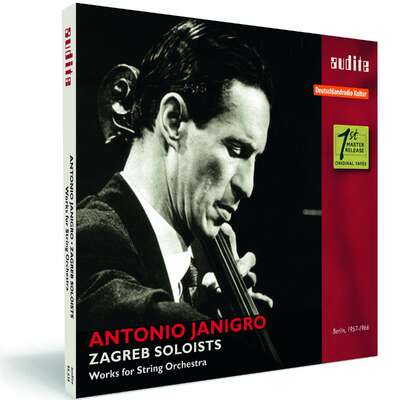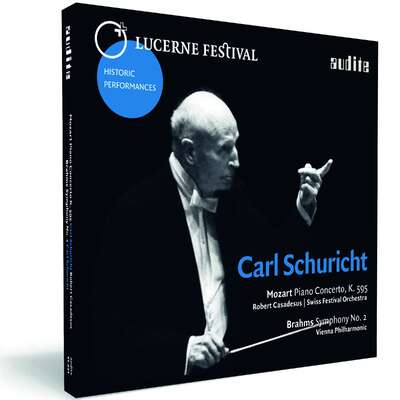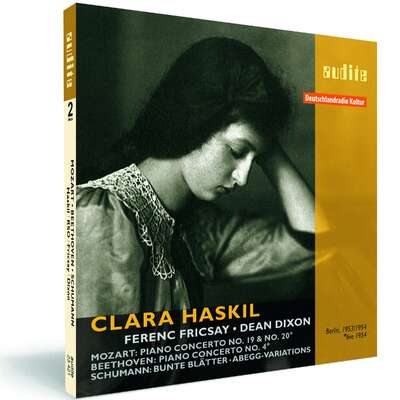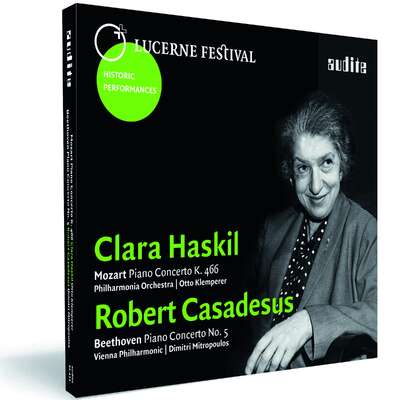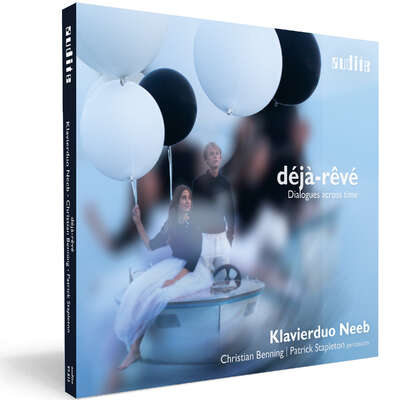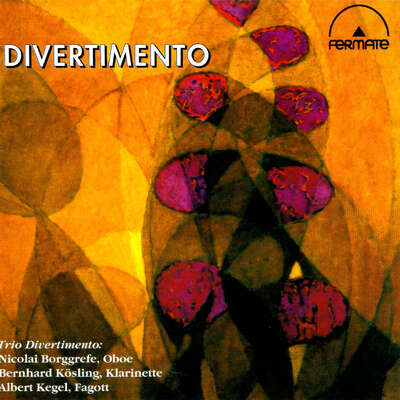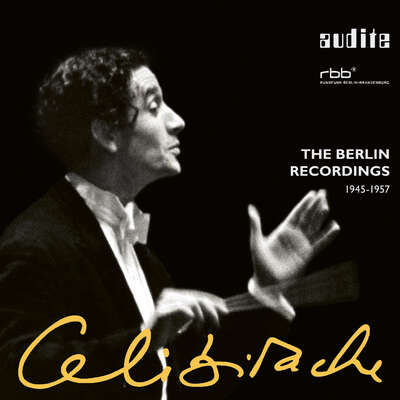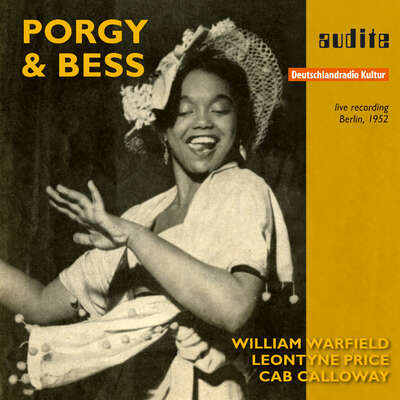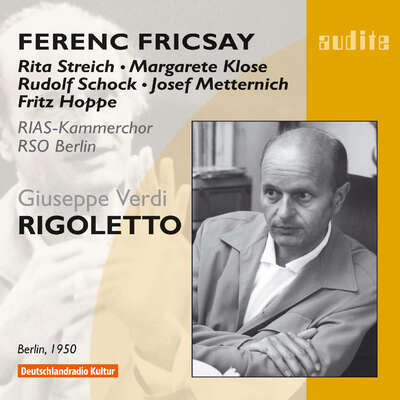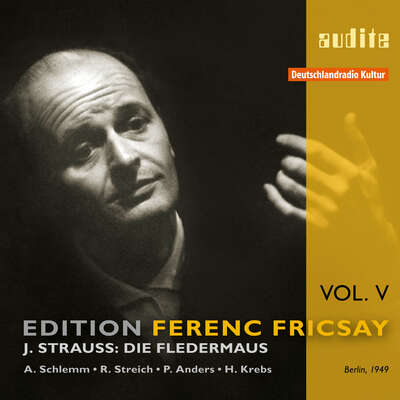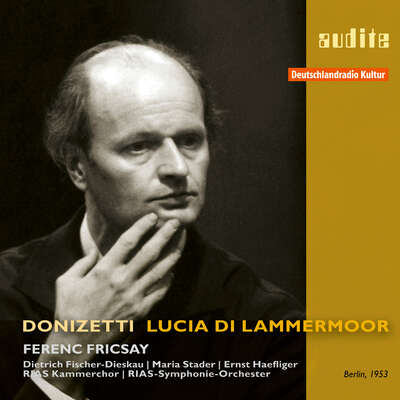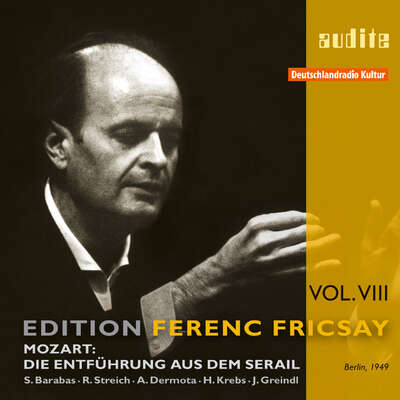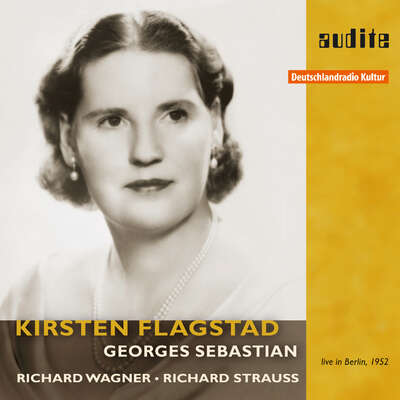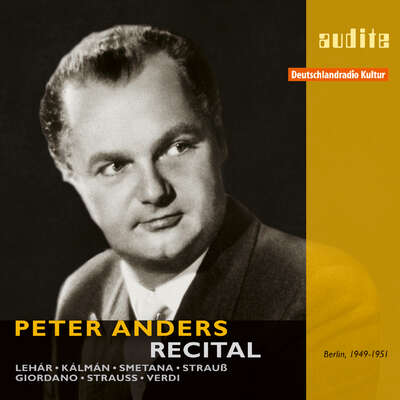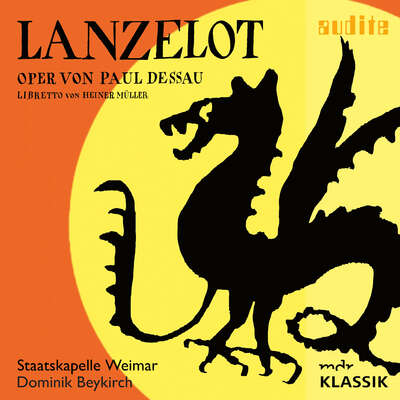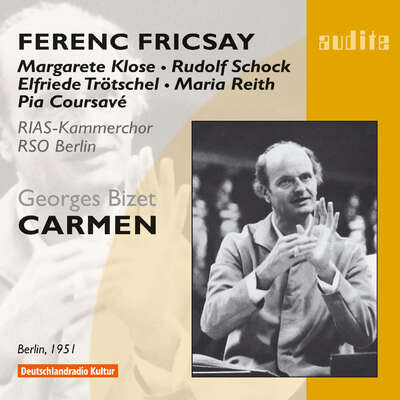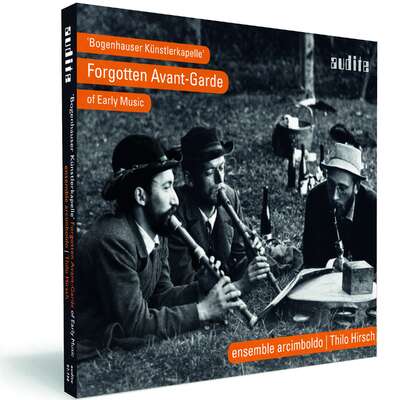
Ferenc Fricsay ’s first complete recording of a Mozart opera was made in December 1949 for the RIAS Berlin. For Fricsay, Mozart was the barometer of musical interpretation . In his reading of Mozart, he differed noticeably from the performance practice of his time: he used smaller forces...more
"A musical and intellectually satisfying experience, this sonic restoration of Fricsay’s first opera recording marks a vivid moment in Mozart performance-practice, from one of his most illustrious acolytes." (Audiophile Audition)
Track List
Details
| Edition Ferenc Fricsay (VIII) – W.A. Mozart: Die Entführung aus dem Serail | |
| article number: | 23.413 |
|---|---|
| EAN barcode: | 4022143234131 |
| price group: | BCA |
| release date: | 29. October 2008 |
| total time: | 105 min. |
Bonus Material
Informationen
Ferenc Fricsay’s first complete recording of a Mozart opera was made in December 1949 for the RIAS Berlin. For Fricsay, Mozart was the barometer of musical interpretation. In his reading of Mozart, he differed noticeably from the performance practice of his time: he used smaller forces within the orchestra and choir, both almost in chamber formation, produced a transparent, carefully graded sound within which every detail remains audible. The differentiated sound, the fresh and contrasting tempi and the careful portrayal of details with the whole set lead to a coherent musical concept.
In this recording, akin to a pilot scheme, Fricsay’s Mozart ideals are clearly outlined.
For the "Entführung aus dem Serail" we have produced an audio trailer. This trailer shows the story line of the opera in a short entertaining form.
The production is part of our series "Legendary Recordings" and bears the quality feature "1st Master Release". This term stands for the excellent quality of archival productions at audite. For all historical publications at audite are based, without exception, on the original tapes from broadcasting archives. In general these are the original analogue tapes, which attain an astonishingly high quality, even measured by today‘s standards, with their tape speed of up to 76 cm/sec. The remastering – professionally competent and sensitively applied – also uncovers previously hidden details of the interpretations. Thus, a sound of superior quality results. CD publications based on private recordings from broadcasts cannot be compared with these.
Reviews
Die Tonkunst | Juli 2013 | Tobias Pfleger | July 1, 2013 Edition Ferenc Fricsay – Werke von Haydn, Mozart, Beethoven, Rossini, Bizet, Brahms, Strauß, Verdi, Bartók u. a.
Ferenc Fricsay gehörte zu den bedeutenden Dirigenten des mittleren 20.Mehr lesen
Classic Collection | December 2010 | December 1, 2010
Ferenc Fricsay's first complete recording of a Mozart opera was made inMehr lesen
Fanfare | Issue 33:2 (Nov/Dec 2009) | Mortimer H. Frank | November 1, 2009
This release offers radio performances recorded in1949 and should not be confused with the fine account led by Fricsay four years later for DeutscheMehr lesen
classiqueinfo-disque.com | dimanche 25 octobre 2009 | Laurent Marty | October 25, 2009 Un Mozart enlevé en force
Les enregistrements d’opéras en studio de Ferenc Fricsay ne rendent queMehr lesen
Ópera Actual | Julio 2009 | Juan Cantarell | July 1, 2009
Por más que existan muchas y buenas grabaciones del Rapto mozar-tiano,Mehr lesen
Audiophile Audition | May 2009 | Gary Lemco | May 22, 2009
This Abduction from the Seraglio enjoys that fluid resonance with which weMehr lesen
Scherzo | mayo 2009 | Enrique Pérez Adrián | May 1, 2009 Fricsay,Karajan
Sigue la extraordinaria Edición Frícsay en el sello alemán AuditeMehr lesen
Gramophone | May 2009 | Richard Wigmore | May 1, 2009 An Abduction worth hearing, but Fricsay's studio version is still superior
The famously baton-less Ferenc Fricsay was always an invigorating Mozart conductor, favouring slimmed-down forces, urgent (yet never hectic) tempi andMehr lesen
Drawbacks include matt mono sound that sets the orchestra too far back in relation to the voices and makes the violins sound thin and papery. The Turkish department jangles vaguely in the background. Rehearsal time was evidently at a premium; and while the RIAS orchestra plays with spirit, ensemble – especially wind chording – can be ragged. Fricsay, like all other conductors of his era, has no truck with ornamentation, or even basic appoggiaturas. As in all recordings before the 1960s, Belmonte's dramatically redundant aria "Ich baue ganz" is jettisoned; less forgivable is the whopping cut in Konstanze's "Traurigkeit".
Sari Barabas is not the only Konstanze on disc to sound like a Blonde raised above her social station. She sings what remains of "Traurigkeit" with feeling and shows a defiant spirit in "Martern aller Arten". But her ultra-bright, slightly fluttery tone, prone to squeakiness above the stave, is far from ideal in a role that needs the dramatic intensity of a Donna Anna, the tenderness of Pamina and the spitfire brilliance of the Queen of the Night. Barabas also lacks a trill, that must-have of any soprano in the 18th century. The rest of the cast, though, is excellent. Anton Dermota, always a graceful Mozart stylist, sings with plangent, liquid tone, and avoids making Belmonte sound passively wimpish. Streich's bubbly, sharp-witted English maid and Greindl's fat-toned Osmin, gleefully relishing his imagined triumph in his final aria, are just as vivid as in 1954. Their mutual taunting near the start of Act 2 is one of the performance's highlights. The Pedrillo, Helmut Krebs, brings an unexaggerated comic touch to the flustered mock-heroics of "Frisch zum Kampfe". As in many other Entführung recordings actors are bussed in for the dialogue, making for some jarring mismatches between speech and song. Only Streich and Greindl – happily – are allowed to speak their own lines. While Fricsay's studio recording has far superior sound, tighter orchestral playing and a better Konstanze in Maria Stader, I'm glad to have heard this, above all for Dermota's lyrical, impassioned Belmonte.
BBC Music Magazine | March 2009 | Anthony Pryer | March 1, 2009
In this first complete recording Barabas is impressively agile and focused, Krebs superb, and the rest very pleasing. Spirited (if slightly erratic)Mehr lesen
Pizzicato | 1/2009 | Alain Steffen | January 1, 2009 Abenteuer Musik
Wenn es derzeit einen Preis für die interessantesten Booklets geben würde, so wäre meine Wahl schnell gefallen. Anstatt die immergleichenMehr lesen
Fricsays ‚Entführung’ von 1949 ist der fünf Jahre späteren DGG-Aufnahme in meinen Augen leicht überlegen. Sie ist in erster Linie lebendiger und spontaner, berührt und amüsiert weitaus mehr als die etwas steril und kontrolliert anmutende Produktion von 1954. Sari Barabas ist eine leichte und sehr lyrische Konstanze, Anton Dermota ein geschmeidiger und stilvollendeter Belmonte, Rita Streich gibt die wohl beste Blondchen der Schallplattengeschichte während Helmut Krebs als Pedrillo keine Wünsche offen lässt. Josef Greindl ist als Osmin einfach köstlich, allein seine stimmgewandte Interpretation ist die Anschaffung dieser Doppel-CD wert.
Fricsays Fledermaus stand immer etwas im Schatten von den beiden Wiener Produktionen unter Clemens Krauss und Herbert von Karajan. Eigentlich zu unrecht, wie man leicht feststellen kann. Die Dialogregie von Heinz Tietjen, der sich ebenfalls für die Dialoge bei der Entführung verantwortlich zeigte, ist vorzüglich, der Gesang besitzt allerhöchstes Niveau, wenn auch der Einstein von Peter Anders (wie auch der von Patzack unter Krauss) Geschmackssache bleibt. Fricsay distanziert sich in seinem virtuosen Dirigat von der typisch wienerischen Operette und zeigt, dass man mit straffen Tempi und markanten Akzenten diese Oper erst gar nicht in die Nähe des Kitsches bringen muss.
Auch die Aufnahmen von Mozarts Symphonien Nr. 29, 39 und 40 sind historische Perlen. Fricsay stellte bereits Anfang der Fünfzigerjahre die Weichen für ein neues Mozart-Verständnis, das sich durch extreme Klarheit, einen dramatischen Ablauf und einen konsequenten Ablauf definiert. Kein Gefühl von Lieblichkeit mag da aufkommen, er strafft die Musik, verzichtet auf Nettigkeit und zeigt Mozart unverblümt und ehrlich als einen modernen, ernsthaften und kritischen Komponisten. Ein Mozart-Bild, das sicherlich nicht von seinen Kollegen Furtwängler, Walter und Karajan geteilt wurde. Nur Otto Klemperer hatte vor Harnoncourt und Co. den gleichen Mut, Mozart von dieser Schiene der Gefälligkeit abzubringen.
Demnach sind alle drei Produktionen wichtige musikhistorische Dokumente, die wir heute als richtungsweisend erkennen und aus denen wir auch jetzt noch lernen können. Die drei Mozart-Symphonien und die Entführung besitzen darüber hinaus einen wirklichen Referenzcharakter. Und dank eines an sich hervorragenden Klanges kann man sich diese Aufnahmen mit allergrößtem Vergnügen anhören. Eine Firma wie Audite kann man nur ermutigen, so weiter zu machen und dem Musikliebhaber weitere Schätze zugänglich zu machen.
Journal de la Confédération musicale de France | décembre 2008 | December 1, 2008
Comme en tout ce qui est sorti de la baguette de ce merveilleux chef, «Mehr lesen

















